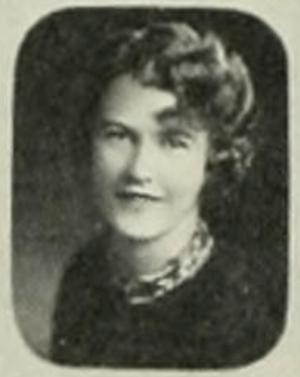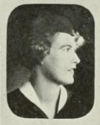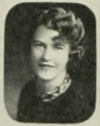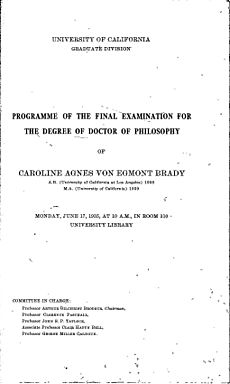Caroline Brady (philologist) facts for kids
Quick facts for kids
Caroline Brady
|
|
|---|---|
 |
|
| Born |
Caroline Agnes Brady
October 3, 1905 Tientsin, China
|
| Died | November 5, 1980 (aged 75) |
| Nationality | American |
| Occupation | Philologist |
| Years active | 1933–1983 |
|
Notable work
|
The Legends of Ermanaric (1943); three articles on Beowulf (1952, 1979, 1983) |
| Signature | |
 |
|
Caroline Agnes Brady (born October 3, 1905 – died November 5, 1980) was an American philologist. A philologist is a person who studies language in historical texts. She focused on very old languages like Old English and Old Norse.
Her important works include a book from 1943 called The Legends of Ermanaric. This book was based on her Ph.D. studies. She also wrote three important articles about the famous Anglo-Saxon poem Beowulf. Caroline Brady taught at several well-known universities. These included the University of California, Berkeley, the University of Pennsylvania, Johns Hopkins University, and Harvard University.
Caroline Brady was born in Tientsin, China, but she was an American citizen. As a child, she traveled a lot. She lived in places like Los Angeles, California, British Columbia, and Austin, Texas. She went to the University of California for her studies. There she earned her bachelor's, master's, and Ph.D. degrees by 1935. After finishing her studies, she became an English instructor. She later became an assistant professor at Berkeley. She also taught at the University of Pennsylvania. Later, she taught briefly at Central Oregon Community College.
Brady's book, The Legends of Ermanaric, explored stories about the Gothic king Ermanaric. People saw her as a very careful and independent researcher. Her articles on Beowulf were also very important. A scholar named Katherine O'Brien O'Keeffe called them "fundamental studies." They helped people understand the deep meanings of words in the poem. Brady believed the Beowulf poet was a true artist. She thought the poet used many different words and phrases skillfully.
Contents
Her Early Life and School Days
Caroline Agnes Brady was born on October 3, 1905. Her birthplace was Tientsin, China. Her father, David John Brady, was a United States Army Colonel and engineer. Her mother was Annie Lucy Maude Short. They had married in Shanghai the year before Caroline was born. Caroline was the older of two sisters. Her sister, Frances Maud Brady, was ten years younger.
Caroline's father was raised in Austin, Texas. He traveled often because of his army work. Her uncles, John W. and Will P. Brady, were important lawyers and judges in Texas. Will P. Brady was the first district attorney of Reeves County, Texas. He later became a judge in El Paso. John W. Brady was also a judge and assistant attorney general in Austin.
In May 1910, when Caroline was four, her family moved to Los Angeles, California. They traveled by ship from Shanghai. The ship, named Bessie Dollar, had a difficult journey. It even hit a whale! By the end of that year, her family was living in British Columbia. During World War I, her father served overseas in the army. Caroline and her family stayed with her uncle, John W. Brady, in Austin. Her father returned in 1919. By the next year, he was working in Los Angeles.
In August 1924, Caroline Brady started college. She went to the University of California at Los Angeles (UCLA). She studied to become a kindergarten teacher. Caroline was very active in student groups at UCLA. She was part of Beta Phi Alpha and the YWCA. She was also president of the Prytanean Society.
She earned her first degree, a Bachelor of Arts in English, in 1928. Two years later, in 1930, she received her Master of Arts degree. She got this degree from the Berkeley campus. In the same year, she began working on her Ph.D. at Berkeley. She finished her Ph.D. in 1935. Her main project was called The Legends of Ermanaric.
A Special Family Name
Sometimes, Caroline Brady was called Caroline Agnes Von Egmont Brady. Even though her published books and articles used "Caroline A. Brady," her Ph.D. defense program used the longer name. Some library records and lists of the Modern Language Association also used "Von Egmont." This part of her name came from her great-great-great-grandfather, Anthony Van Egmond. He was an early settler in Canada.
Her Work and Studies
In 1935, after getting her Ph.D., Caroline Brady became an English instructor. She taught at the College of Agriculture at the University of California. On July 13, 1941, she was promoted. She became an assistant professor of languages and literature at the Berkeley campus.
In 1943, her Ph.D. project was published as a book. It was called The Legends of Ermanaric. She taught at Berkeley until 1946. After that, she taught for three years at the University of Pennsylvania. She was an assistant professor of English there.
In 1949, Brady moved to Klamath Falls, Oregon. She was one of the first four teachers at the new Central Oregon Community College. She taught English Composition and English Literature. After a few months, she left her position.
Teaching and Research
By May 1952, Brady was working as a synonym editor. She worked for C. L. Barnhart, Inc., a dictionary publisher. That year, she received a special award. It was the 1952–53 Marion Talbot Fellow of the American Association of University Women. This fellowship gave her money to study old English poetry. She wanted to understand how words were used in different ways.
Brady's research took place at Johns Hopkins and Harvard. In 1952, she published two articles related to her study. These were "The Synonyms for 'Sea' in Beowulf" and "The Old English Nominal Compounds in -rád."
After these articles, her activities are not very clear for a while. In 1979, she was listed with a California address again. That year, she published another article about Beowulf. It was called "'Weapons' in Beowulf." Her final work in this series was "'Warriors' in Beowulf." It was published in 1983, after she had passed away.
Later Life
In a 1941 entry in Who's Who in California, Caroline Brady was described as a Democrat. She was also an Episcopalian. Her father died in January 1953. Her mother passed away in November 1959.
Caroline Brady herself died on November 5, 1980. She passed away in Bellevue, Washington. The year before her death, she was living in Corona del Mar. Her sister, Frances Brady Ackley, died later in 1993.




